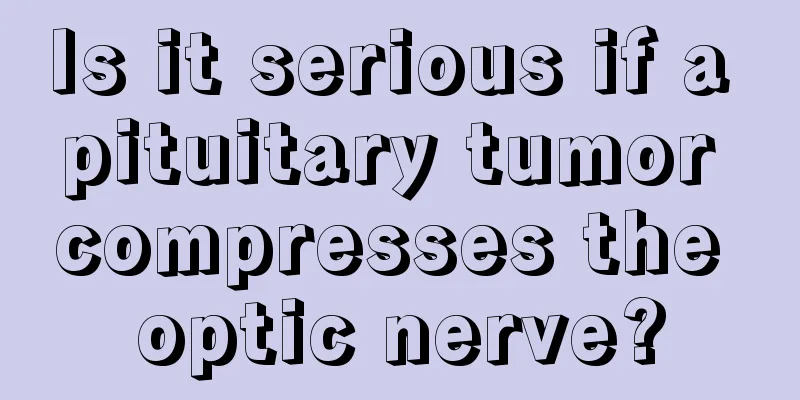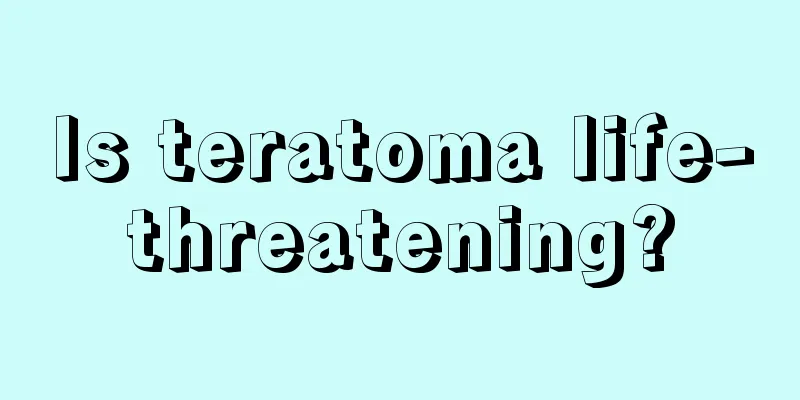Is it serious if a pituitary tumor compresses the optic nerve?

|
Pituitary tumors can cause severe compression of the optic nerve, which may lead to decreased vision, visual field loss, or even blindness. Medical treatment is required in a timely manner. Treatment methods include medication, surgery, and radiotherapy. The specific choice depends on the condition and Pituitary tumors are benign tumors that occur in the pituitary gland, but when they grow in size, they may compress surrounding structures, especially the optic nerve. When the optic nerve is compressed, the patient may experience symptoms such as blurred vision, visual field loss, and bitemporal hemianopsia, and in severe cases, even blindness. The severity of pituitary tumor compression of the optic nerve depends on the size and location of the tumor and the duration of the compression. 1. Drug therapy is one of the common treatments for pituitary tumors, especially for secretory pituitary tumors. Dopamine receptor agonists such as bromocriptine and cabergoline can effectively reduce the size of prolactinomas and reduce the pressure on the optic nerve. Somatostatin analogs such as octreotide and lanreotide are suitable for somatotropinomas and relieve symptoms by inhibiting tumor growth. 2. Surgical treatment is a direct way to relieve optic nerve compression. Transsphenoidal surgery is a common minimally invasive surgical method that enters the sphenoid sinus through the nasal cavity to remove the tumor, with little trauma and quick recovery. For larger or complex tumors, craniotomy, such as transcranial approach surgery, may be required to completely remove the tumor and relieve compression on the optic nerve. 3. Radiotherapy is suitable for patients with residual tumors after surgery or who are unable to undergo surgery. Stereotactic radiosurgery such as Gamma Knife and CyberKnife can accurately irradiate tumors and reduce damage to surrounding normal tissues. Conventional radiotherapy is suitable for larger tumors and controls tumor growth through multiple low-dose irradiations. The severity of pituitary tumor compressing the optic nerve cannot be ignored, and early diagnosis and treatment are crucial. Drug therapy, surgical treatment, and radiotherapy each have their own advantages, and a personalized treatment plan should be developed based on the patient's specific situation. Regular follow-up and imaging examinations can help monitor changes in the disease, adjust treatment strategies in a timely manner, protect visual function, and improve quality of life. |
<<: The three most feared symptoms of colorectal cancer recurrence
>>: What are the symptoms of pituitary tumor invading the cavernous sinus
Recommend
How long can you live after surgery for mid-term liver cancer
How long can you live after surgery for mid-stage...
The significance of exercise after breast cancer surgery
The incidence of breast cancer in countries aroun...
Which collagen is more effective?
Collagen is a biological macromolecule that exist...
The best treatment for eczema in one-month-old babies
If a one-month-old baby suffers from eczema. Ther...
The benefits of drinking fennel soaked in water
Friends who are familiar with spices all know or ...
What are the symptoms of lung cancer? These are the common symptoms of lung cancer
Everyone is very scared when they hear about lung...
How is testicular cancer diagnosed
Testicular cancer, as the name implies, is a type...
What to do if urinary tract infection recurs? 6 things you need to pay attention to
Recurrent urinary tract infections are very dange...
Is it okay to wash your face without facial cleanser?
In daily life, many people do not use facial clea...
Low fever, runny nose, sneezing
Low fever, runny nose and sneezing are usually ca...
What medicine can cure small cell lung cancer
What medicine can cure small cell lung cancer? Mo...
What kind of water can whiten and lighten spots
As women, we all hope that our skin is healthy an...
Can Astemizole treat urticaria?
Urticaria is a skin disease that is very botherso...
Diffuse liver cancer
Diffuse liver cancer Liver cancer is a very serio...
Can pregnant women eat pickled mustard greens?
When there is a pregnant woman in the family, the...









